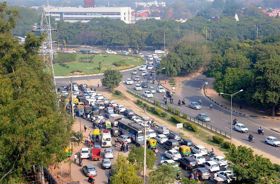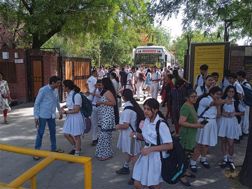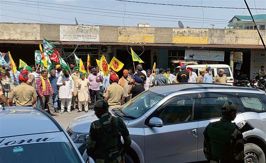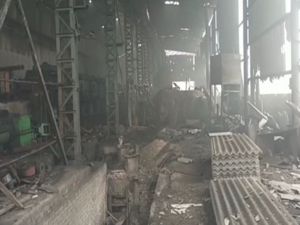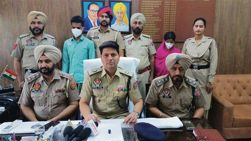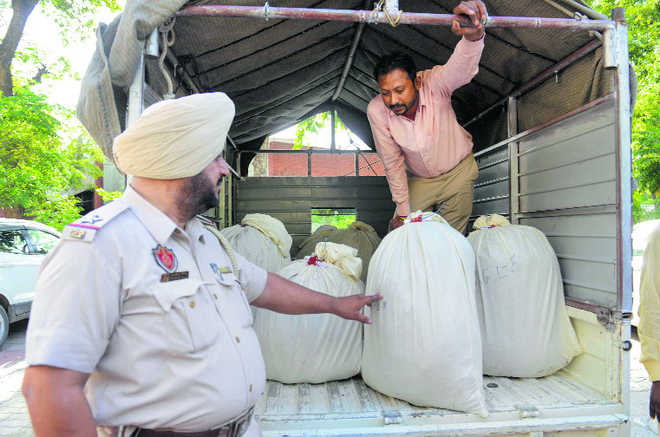
Punjab Police personnel and workers unload bags of suspected heroin and mixed narcotics from a truck to be brought to the court. File photo
Mukesh Ranjan in New Delhi
The trans-border drug trafficking has again hit the headlines with the largest ever one-time seizure of 532-kg heroin worth Rs 2,600 crore by the Customs Department at the Attari Integrated Check Post (ICP) in Amritsar on June 30. This may be a big success for the Customs and other enforcement agencies in their war against drugs, but rings alarm bells. It calls for a thorough relook at the drive against drugs and also raises the demand for better intelligence and Centre-state and inter-state coordination in dealing with the menace. The seizure also reinforces the presence of cross-border and inter-state dynamics of the drug cartels involving “invisible big fishes” and terror links.
Read also:
“Punjab has always been vulnerable to smuggling, for there is a market for it. During my tenure, gold was the main item of smuggling. Today, it is drug smuggling and it has gone up to horrific levels. The traffickers probably have protection from powerful people. It is time for Punjab Chief Minister to crack the whip,” he said.
Acknowledging that the Punjab Government alone can’t be blamed for all that has been happening at the border, the former DG said the Central government and agencies like the Intelligence Bureau (IB), the BSF and others must answer as to how consignments are crossing the borders. With the kind and amount of money involved, one can well conclude that the nexus between terrorism and drug trafficking can’t be ruled out, he added.
Sources in the IB, however, claimed that the recent big drug haul in Punjab on June 30 and in Manipur on June 29 (the latter weighing 111.91 kg and worth Rs 100 crore) could be possible only on the basis of specific information. It is baffling how narcotics in such a big quantity passed through the truck scanners installed at the ICP on the Pakistan side.
Sources said the truck with seized narcotics and bags of rock salt granules had arrived at Attari on June 24, but was stopped after it was found containing suspicious substance. However, two days later, Pakistani officials allowed it to cross the border. “We had information with us and accordingly alerted the Customs officials at the ICP. They conducted a physical check on the arrival of the truck,” a senior IB official said.
Emphasising on Pakistan’s role in pushing drugs, a senior official of the Ministry of Home Affairs (MHA) said that as there has been a consistent crackdown on the separatists and terrorist elements in Jammu & Kashmir, “Pakistan-based operators have shifted their focus on the International Border (IB) adjoining Punjab”. He said directions have been issued to the BSF to be “more vigilant and alert”.
Meanwhile, the Centre plans to establish a unit of the Narcotics Control Bureau (NCB) in Amritsar. The MHA official said the issue was under “active consideration of the government”, particularly in view of the changing stance of the traffickers, putting the spotlight on Punjab. “Intelligence reports are also suggesting that serious attempts are being made to revive Sikh militancy in the state and drug trafficking comes handy in funding such nefarious activities,” he said.
However, while conceding that India continues to be highly vulnerable to narcotic drug trafficking as it is located between two largest opium-producing regions in the world — Golden Crescent in the West and Golden Triangle in the East — the official said, “It is a real challenge for the enforcement agencies to curb diversion of precursor chemicals, their production and trafficking.”
The official, however, contended that so far various drug law enforcement agencies, including the Customs, Directorate of Revenue Intelligence, the NCB and the police in different states have made seizures of 2,191 kg opium, 2,939 kg heroin, 2,96,792 kg ganja, 3,657 kg hashish and 93 kg cocaine. “The agencies have even destroyed illicit cultivation of cannabis and opium poppy all over the country,” he added.
Highlighting several policy and other initiatives by the government to deal with the issue of drug trafficking, the official said a Narco-Coordination Centre was established in November 2016. New Reward Guidelines with increased quantum for interdiction or seizure of different illicit drugs had also been introduced, he added. The official also informed that the NCB has developed a new software called “Seizure Information Management System” for creating an online database of drug offences and offenders.






















